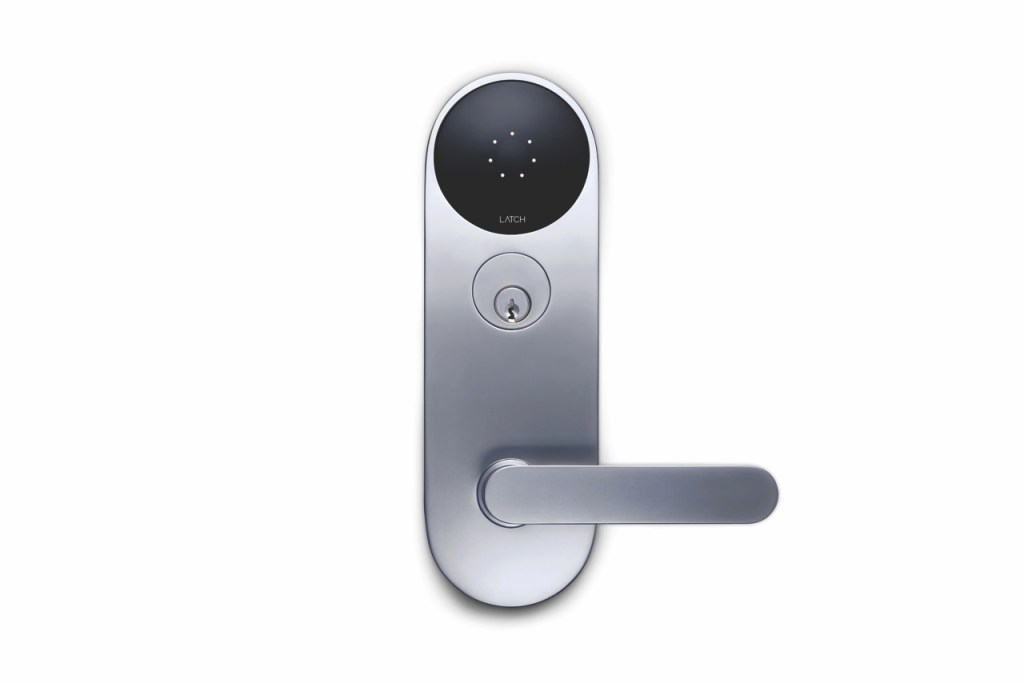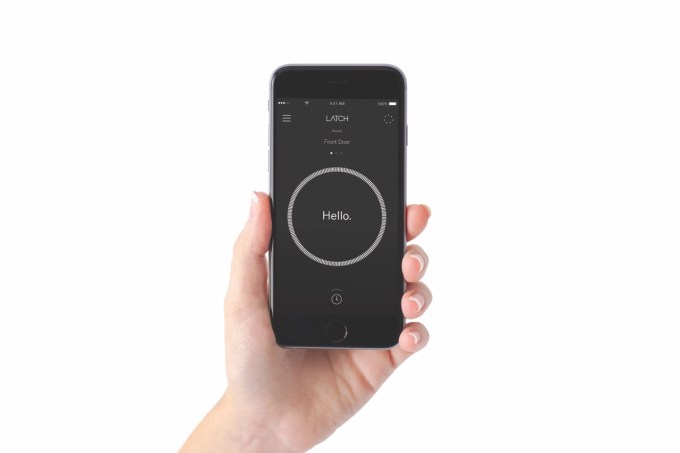On the surface, the smart lock space can seem pretty crowded already, with names like Lockitron and August and Kisi and Kevo apparently in play for several years. But New York based Latch contends it’s mostly still noise. Aka a lot of crowdfunding campaigns, and a lot less actual product delivery.
That noise is part of the reason why Latch has spent the past two years keeping its head down focused on developing its first product — bar the odd bit of press coverage, including from when it graduated from the R/GA accelerator this time last year. The founding team includes two ex-Apple employees: CEO Luke Schoenfelder, who worked in worldwide government affairs for Cupertino, and a former senior Apple designer, Thomas Meyerhoffer, Latch’s chief design officer.
The startup is now ready to start manufacturing its first smart lock product, which is targeted at the enterprise market, and specifically aims to address multi-occupancy apartment blocks such as mansion blocks and/or offices (rather than being intended for front doors of individual apartments). It’s also coming out of stealth proper to discuss the product, the eponymous Latch Lock, and disclose how much funding it’s raised — announcing a $10.5 million Series A round led by Lux Capital today.
Other investors in the Series A round include Primary Venture Partners, Corigin Venture Partners, Camber Creek, Expansion Ventures, PCH, Camber Creek, 3rd Prime Capital, R/GA, Techstars, Wan Li Zhu of Fairhaven Capital and Zach Aarons of MetaProp. In total it’s pulled in $16 million in funding to date since being founded in 2014.
It also has a number of funds from the real estate sector as strategic backers — strategic given that’s the sector it’s targeting its “enterprise grade” smart locks at — although it’s not naming who these backers are specifically. (It will say that some of these investors have been its beta users up to now, given some of these individuals live in the buildings they own where Latch locks have in turn been trialled.)
It will be using the new funding to scale its operations and manufacturing capacity, and to deploy its locks to — it hopes — “a wide variety of customer across the US”, says Schoenfelder.
“The thing that’s been cool is that many of the folks that we’ve raised money from are our customers, and so the validation that we’ve gotten on that around are people actually going to buy this, are people excited about this, we’ve got a very direct feedback loop around that so we’re really confident that the market needs this product and is excited about it,” he adds.
The startup is not disclosing how many enterprise customers it has signed up at this point, although clearly its real estate investors give it confidence it has building owners ready and willing to invest in shiny new next-gen locks. Schoenfelder tells TechCrunch Latch will be deploying its first proper pilot buildings in Q1 of this year, in New York where it’s headquartered.
Unlike some other smart locks in the market, Latch locks are not retrofit over existing locks but are designed to be the replacement lock/entry mechanism (Schoenfelder argues that smart locks that attempt to retrofit over existing locks aren’t so simple in practice, throwing up various fit and operational issues). So the product design includes an actual physical mortise lock mechanism, as well as various ‘smarter’ flourishes — such as a camera, touchscreen and Bluetooth — to allow for digital keys to be used to gain entry, callers to be screened and other smart lock features such as entry tracking. Latch’s hardware will also support unlocking via Apple’s Touch ID.
The product has a touchscreen so users can input one-time entry codes, thereby allowing people to gain entry to a Latch locked building without having to own or use a smartphone (or indeed have downloaded a dedicated app) just to get access.
“You have the circular interface, which is the touch panel. It’s a very simple and iconic solution,” says Meyerhoffer. “You can email the user a code, a one-time access or over a period of time. We’ve been really thinking about these different steps or these different levels of being able to access the building.”
The inclusion of an actual physical lock for traditional metal keys offers a familiar entry point for users who might not be comfortable with the various ‘smarter’ entry methods of Latch, as well as offering a backup entry option for those whose phone battery has died (or whose phone has been lost).
Another distinguishing difference the team points to is a tamper detection feature to warn if someone is trying to pick the lock. As with other smart locks, the Latch Lock will track comings and goings, keeping a log of who has gained entry and for how long, which can be shared with building owners or apartment owners.
On the enterprise grade side, the Latch has been designed to comply with the highest buildings grade lock standards, says Schoenfelder. The pair are dismissive of consumer smart lock ‘gadgetry’ that’s been crowdfunded in recent years, arguing enterprise customers will need a lot more confidence that the hardware they’re being sold will last and won’t come with any unwelcome surprises.
“We have the highest lock safety and security rating on our products that you can get. The highest fire ratings — all these things are required to operate in large buildings,” says Schoenfelder. “I’ll give you an example, we have something called single motion egress which in layman’s terms means that if there’s a fire you can always turn the door handle and everything unlocks automatically so you can get out very quickly. And that’s required in most major metropolitan areas in the US and we’re the only smart lock that has that feature.”
“We see our biggest competition as the status quo. Metal keys have been around for thousands of years and people… don’t always change their behaviors overnight and so for us it’s about creating a system that offers the same reliability and security and safety as physical keys but offers all of these amazing new features that digital access can provide,” he adds.
“We have spent a long time getting this right,” adds Meyerhoffer. “So there’s been a great space for the design to be developed and thought through. Of course one of the most important things for a lock company or an access company in general is just giving the right values out — and that’s trust and longevity and some sort of mindfulness of the whole experience. We didn’t want to launch until we were ready.”
Latch is not disclosing its per lock pricing yet, but will say it plans to offer flexible options so customers who prefer to spend more on capex up front can, and those that prefer lower capex but are ok with a higher opex will also be able to sign up for some sort of subscription style package.
Given it’s targeting apartment blocks, Latch looks most similar to German startup Kiwi.ki, which took part in the TC Disrupt Europe battlefield back in 2013 (and which has a partnership with Deutsche Post in Germany to make it easy for mail carriers to gain access to apartments). But Kiwi.ki is focused on the German market so remains far from Latch’s backyard. Certainly for now (although the Latch team reckons there’s no barrier to rolling their product out internationally in future, in markets such as Europe and China where mortise locks are also common).
What about battery life? As with other smart locks, the Latch Lock needs power for its fancier features to function (although its metal mortise lock will still function sans power). The team won’t specify exact battery specs at this stage but they will say it will have a larger battery “than anything else on the market”.
Schoenfelder adds that longevity wise the target is for “about 12 months” of operation — although he notes that it will depend on usage. “If you’re somebody who uses it a lot, you have a lot of people coming and going everyday, then it will last a shorter period of time. If you’re using it a couple of times per day, more for personal use, it will last longer than that. But our target has been to last for about 12 months,” he adds.
Another battery-related feature he flags up is the fact the Latch syncs battery data every time the owner unlocks the door — to help ensure “predictability” on its longevity front, as he puts it.
“The other thing that we do is that because we’re not just dependent on smartphone unlock is that we have sort of a graceful power-down,” he adds. “So that when your battery gets low we’ll shut off all the additional sensors and just leave the touchscreen functioning. So that you can still get in but not all of the features will work, so that you’re given a long grace period to change the batteries.”
On the privacy side, Latch does hold encryption keys for the data being gathered by its locks — such as who has gained entry and when — so in theory it could be subpoenaed to hand over that data to law enforcement/security agencies (for example).
“We hold the encryption keys and maintain the security for the product,” confirms Schoenfelder, adding: “We do not have and are intentionally not creating a view where we’re going to see individual access logs. We will obviously maintain that data in aggregate to serve to the individual tenant so that they can see their timeline, the building management so they can see their timelines but we’re purposefully avoiding the ‘godview‘ type problem that some other service providers have created for themselves by having all of this data accessible to employees etc.”
Given its first product is addressing the primary door of an apartment block, rather than individual apartment front doors, the pair argue these are public/communal areas anyway so expectations of privacy would naturally be lower than for actual front doors.
That said, Latch sounds as if it has plans to develop a whole range of smart locks down the line, so it may be offering a smart lock product for actual front doors in future too. Ergo the privacy piece is likely to get more complex — but at least Latch is sensitive to the issue.
“[Privacy] is something I think about a lot,” says Schoenfelder, whose LinkedIn profile lists “consumer privacy” as one of the issues he worked on when he was at Apple. “Not just in the context of Latch but as a user of so many of these services — where do I feel comfortable and where now as I’m creating one of these services, should I ask our users to be comfortable. What would I be comfortable with?
“When I was at Apple this was one of the main things that we were trying to figure out — what are the standards that are going to be best practice for the industry? And for us I think we’re taking a very Apple approach in this, which is we don’t want to have any additional data. We really want to intentionally leave the data in control of the people who are creating it.”
































Comment